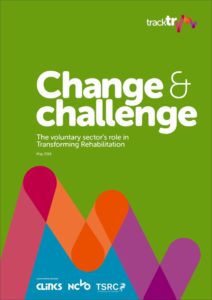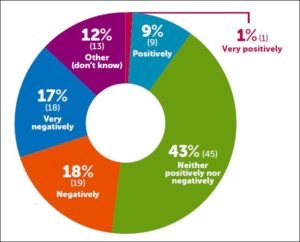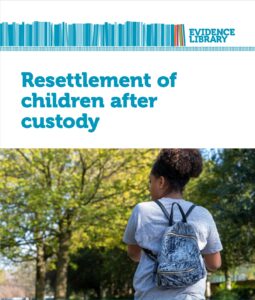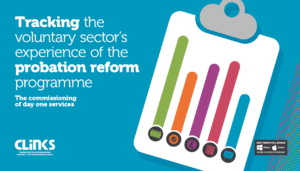Change and Challenge – the voluntary sector’s role in Transforming Rehabilitation
Last week (31 May 2016) Clinks in collaboration with NCVO & Third Sector Research Centre published the second of a series of reports tracking the voluntary sector’s experience of the new probation system known as Transforming Rehabilitation [you can see a summary of the first report here].
Based on a survey of 151 voluntary sector organisations in mid-late 2015 into their views on the changes to probation, the report made six key findings and seven recommendations.

The key findings are set out below.
The pace of change is slow
The changes to probation services are taking a long time to embed. Given the scale of reform this is not entirely surprising but the pace of change has still been much slower than many anticipated. The pace of change is reported to be curbing investment in the voluntary sector’s rehabilitation and resettlement services, meaning that services run by the voluntary sector are vulnerable and at a greater risk of closure.
TR provides little funding for voluntary sector
Only one quarter of the surveyed organisations reported being funded through a CRC’s supply chain. Those that are in supply chains are disproportionately larger voluntary sector organisations, with very few smaller or medium sized organisations represented. However, the contribution of voluntary sector organisations outside of supply chains to rehabilitation and resettlement outcomes is considerable. Half of the voluntary organisations outside of supply chains still receive and accept referrals from CRCs and the NPS, whilst over two thirds receive referrals directly from prisons.
Poor communication
The voluntary sector’s relationships with CRCs and the NPS are being negatively affected by a lack of communication about future strategy, service development and commissioning opportunities. Many voluntary organisations also report a mixture of confusion and uncertainty about what services are being offered through CRCs and the NPS.
The NPS needs to work more effectively with the voluntary sector
Only one survey respondent had a direct funding relationship with the NPS; apparently the ‘rate card’ system limits strategic engagement with the voluntary sector, restricts collaboration as well as innovation and increases the cost of services to the NPS.
Impact on service users unclear
Many voluntary sector organisations could not say whether Transforming Rehabilitation had negatively or positively impacted on services or service users, possibly because the transition to new approaches is still underway. However, those that had seen a change were more likely to report it as negative rather than positive. Additionally, only 3 in 10 organisations funded by CRCs to deliver services in supply chains felt that the level of funding they received allowed them to deliver a high quality service. The graph below shows survey respondents’ perceptions of the impact of the changes brought about by TR on service users:

There was a perception that uncertainty and confusion during the transition period between probation trusts and the CRC and NPS structures had led to a reduction in services and some organisations reported that they saw a ‘narrowing’ of services, with changes in some areas from one-to-one support to more group work, and from more flexible person-centred approaches to a more process driven or ‘box-ticking’ arrangements. This was considered to be particularly damaging for service users with multiple needs or chaotic lifestyles.
Funding uncertainty
Although most voluntary sector organisations reported that their funding for rehabilitation and resettlement services hadn’t been impacted as of yet, there is growing anxiety about the sustainability of services and evidence that the situation needs monitoring. Those outside CRC supply chains are more likely to believe that their services are unsustainable. Organisations also reported that a lack of information about CRC and NPS commissioning intentions is putting other funding sources at risk, particularly local authorities and independent charitable funders.
Seven Recommendations
The Clinks/NCVO/TSRC report makes 7 recommendations aimed at NOMS, the NPS and the 21 CRCs:
- Publish the commissioning intentions of CRCs and the NPS;
- Provide total transparency of supply chain partners;
- Support small voluntary organisations;
- Support communication and engagement with the voluntary sector;
- Enable the National Probation Service to engage with the voluntary sector;
- Closely monitor and assess the quality of services; and
- Support the sustainability of rehabilitation and resettlement services.









One Response
TR is a total mess, will not get any better and charities have been scammed into support this and are now not getting any money from it.